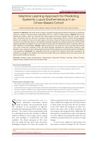 2 citations,
May 2023 in “Current Nutrition Reports”
2 citations,
May 2023 in “Current Nutrition Reports” Eating a Mediterranean diet and taking certain supplements may improve symptoms of PCOS.
 2 citations,
September 2022 in “Cytotherapy”
2 citations,
September 2022 in “Cytotherapy” Fat-derived stem cells show promise for treating skin issues and improving wound healing, but more research is needed to confirm the best way to use them.
 2 citations,
May 2022 in “JAAD case reports”
2 citations,
May 2022 in “JAAD case reports” Using powdered umbilical remnant allograft can effectively treat chronic scalp wounds resistant to traditional treatments.
 2 citations,
April 2021 in “Canadian Journal of Urology”
2 citations,
April 2021 in “Canadian Journal of Urology” Five-alpha reductase inhibitors, like finasteride and dutasteride, can treat enlarged prostates, improve urination, reduce need for prostate surgery, and lower the risk of prostate cancer, but may increase the risk of higher grade prostate cancer. They can also treat male pattern baldness.
 2 citations,
September 2013 in “Journal of Cosmetic Dermatology”
2 citations,
September 2013 in “Journal of Cosmetic Dermatology” Hair restoration combines drugs and follicular unit grafting for natural, long-lasting results.
 2 citations,
August 2013 in “The Lancet. Diabetes & endocrinology”
2 citations,
August 2013 in “The Lancet. Diabetes & endocrinology” The FDA rejected a testosterone drug again due to safety concerns.
 2 citations,
September 2007 in “International Journal of Impotence Research”
2 citations,
September 2007 in “International Journal of Impotence Research” Local testosterone treatment improved sexual desire in a female with fragile X syndrome.
 2 citations,
January 2002 in “PubMed”
2 citations,
January 2002 in “PubMed” The new test shows how hair treatments affect hair's bending stiffness by swinging a pendulum through hair fibers.
2 citations,
May 1984 in “Current Problems in Pediatrics” Pediatricians can effectively treat most acne cases with the right knowledge and patient involvement.
 1 citations,
August 2024 in “Pharmaceuticals”
1 citations,
August 2024 in “Pharmaceuticals” Goat placenta extract in a special delivery system improved hair growth and thickness in chemotherapy patients.
1 citations,
May 2024 in “Pharmaceutics” Hemp is a promising ingredient for skin products due to its healing and soothing properties.
1 citations,
March 2024 in “Nanomaterials” Biomimetic scaffolds are better than traditional methods for growing cells and could help regenerate various tissues.

A functional medicine approach may help long COVID patients by focusing on adrenal fatigue, gut health, and vitamin D deficiency, using diagnostic tools and lifestyle changes.
1 citations,
February 2023 in “Pharmaceutics” New UVA-responsive nanocapsules effectively kill microorganisms in hair follicles when activated by light.
1 citations,
January 2023 in “IntechOpen eBooks” Paclitaxel is an effective cancer drug with side effects and potential new uses beyond cancer.
 1 citations,
January 2023 in “Metabolites”
1 citations,
January 2023 in “Metabolites” Changes in gut bacteria can contribute to the development of Polycystic Ovary Syndrome (PCOS), affecting metabolism, immunity, and causing inflammation. Treatments may involve adjusting these factors.
 1 citations,
January 2023 in “Journal of the European Academy of Dermatology and Venereology”
1 citations,
January 2023 in “Journal of the European Academy of Dermatology and Venereology” The article concludes that more research is needed on how to diagnose and treat hair loss in women with polycystic ovary syndrome.
 1 citations,
December 2022 in “Sultan Qaboos University medical journal”
1 citations,
December 2022 in “Sultan Qaboos University medical journal” The machine learning model accurately predicts Systemic Lupus Erythematosus in Omani patients.
 1 citations,
September 2022 in “Nepal journal of dermatology, venereology & leprology”
1 citations,
September 2022 in “Nepal journal of dermatology, venereology & leprology” Apremilast shows promise for several skin conditions but needs more research.
 1 citations,
April 2022 in “International journal of Ayurveda and pharma research”
1 citations,
April 2022 in “International journal of Ayurveda and pharma research” Ayurvedic treatment helped improve PCOD symptoms and ultrasound results.
1 citations,
October 2021 in “Indian Journal of Plastic Surgery” The paper offers a clear guide for diagnosing and treating hair loss, helping surgeons decide on hair transplant timing and extent.
 1 citations,
July 2021 in “Chemical & pharmaceutical bulletin/Chemical and pharmaceutical bulletin”
1 citations,
July 2021 in “Chemical & pharmaceutical bulletin/Chemical and pharmaceutical bulletin” Rubbing skin increases absorption of water-soluble drugs from lotions and creams, but not oil-soluble drugs.
 1 citations,
January 2018 in “Indian journal of otolaryngology and head and neck surgery”
1 citations,
January 2018 in “Indian journal of otolaryngology and head and neck surgery” The new surgery method successfully healed the patient's nasal wound without complications.
 1 citations,
May 2017 in “Maturitas”
1 citations,
May 2017 in “Maturitas” The document concludes that managing health issues like menopause, cardiovascular risk, and hair loss is crucial for promoting longevity in aging women.
 1 citations,
May 2015 in “Journal of The American Academy of Dermatology”
1 citations,
May 2015 in “Journal of The American Academy of Dermatology” Finasteride for hair loss in young men may significantly increase the risk of sexual dysfunction.
 1 citations,
January 2014 in “Indian Journal of Dermatology, Venereology and Leprology”
1 citations,
January 2014 in “Indian Journal of Dermatology, Venereology and Leprology” The 'Swiss cheese' pattern in scalp biopsies can indicate trichotillomania, not just alopecia areata.
 1 citations,
January 2013 in “International Journal of Medicinal and Aromatic Plants”
1 citations,
January 2013 in “International Journal of Medicinal and Aromatic Plants” Flaxseed ingestion and oil application help rabbit hair grow.
 1 citations,
September 2011 in “UHOD : Uluslararası hematoloji - onkoloji dergisi”
1 citations,
September 2011 in “UHOD : Uluslararası hematoloji - onkoloji dergisi” Looking at tissue characteristics isn't reliable for telling apart basal cell carcinoma from certain benign skin tumors.
1 citations,
July 2010 in “UK vet. Companion animal” Vets should thoroughly examine and tailor treatments for cats with hair loss.
1 citations,
June 2004 in “Sexuality, reproduction & menopause” Eflornithine cream effectively reduces facial hair in women with hirsutism.






















